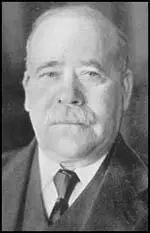Stephen Walsh

Stephen Walsh was born in Kirkdale on 26th August 1859. His parents were of Irish descent. His father, John Walsh, died before his son's birth. His mother died while he was still an infant and he was sent to Kirkdale Industrial School and Orphanage.
In 1872 he went to live with his brother, and at the age of 13 became a working miner at Ashton-in-Makerfield, near Wigan. Walsh met his wife, Anne, daughter of John Adamson, an Ashton miner, when she was working on a colliery pitbank. They were married on 16 August 1885 and had four sons and six daughters.
Walsh became an active trade unionist and in 1890 was elected district officer and secretary of the local union organization. Herbert Tracey has argued: "The conditions of employment at that time were not particularly attractive, and his commencing wage was only one of ten-pence for a ten-hour working day. It was a marked characteristic of that period that education was a blessing shared by few of the adult miners, and inasmuch as many of them were practically illiterate, they were not slow to appreciate the advantages which Stephen Walsh possessed. His sterling character and keen intelligence, too, commanded their respect and confidence, and he was invariably selected to uphold their interests whenever any differences arose." In 1901 he was appointed agent of the Lancashire and Cheshire Miners' Federation.
Walsh was also a member of the Labour Party and in the 1906 General Election, sponsored by the Miners' Federation, he was elected to the House of Commons to represent the Ince division of Lancashire. According to his biographer: "Although he was a man of small stature and homely presence, Walsh made an impact in parliament. He spoke with effect on industrial questions, and he made valuable contributions to debates on the Mines Act of 1911 and on the Minimum Wage Act of 1912."
During the First World War Walsh supported recruiting campaigns and was an advocate of conscription (compulsory military service). David Lloyd George rewarded him by appointing him parliamentary secretary to the Ministry of National Service (March to July 1917) and the Local Government Board (July 1917 to January 1919). The eldest son, Arthur Walsh, was killed in action in 1918.
In the 1918 General Election Walsh was once again elected to represent the Ince division of Lancashire. Walsh was also appointed Vice-President of National Union of Mineworkers in 1922. He was an expert in wage negotiations and was also chairman of the miners' section of the English conciliation board.
In the 1923 General Election, the Labour Party won 191 seats. Although the Conservative Party had 258 seats, Herbert Asquith announced that the Liberal Party would not keep the Tories in office. If a Labour Government were ever to be tried in Britain, he declared, "it could hardly be tried under safer conditions". Ramsay MacDonald agreed to head a minority government, and therefore became the first member of the party to become Prime Minister. MacDonald had the problem of forming a Cabinet with colleagues who had little, or no administrative experience. MacDonald's appointments included Stephen Walsh as Secretary of State for War. The government resigned in November of the same year.
Stephen Walsh died at 8 Swinley Road, Wigan, on 16th March 1929, and was buried at Holy Trinity Church in Ashton-in-Makerfield.
Primary Sources
(1) Herbert Tracey, The Book of the Labour Party (1925)
Like many others who have left their footprints on the sands of time, he came of Irish stock. Nevertheless, he was born in 1859 in Liverpool, where the first years of his life were also spent. Of his early days his knowledge is but scanty. Death robbed him of his parents at so tender an age that of them he cannot retain the slightest recollection. His first vivid memory is of the occasion when, straying aimlessly about the streets of Liverpool, he was picked up by a kindly policeman and carried off to a place of shelter on the officer's shoulders.
Ultimately the Kirkdale Industrial School became the home of his childhood, and he remained there until attaining the age of 14 years, acquiring in the meantime a good elementary education.
He then strode out into the world, and his steps led to Ashton-in-Makerfield, in the Wigan coal-field, where for eighteen years he earned his livelihood as a miner. The conditions of employment at that time were not particularly attractive, and his commencing wage was only one of ten-pence for a ten-hour working day. It was a marked characteristic of that period that education was a blessing shared by few of the adult miners, and inasmuch as many of them were practically illiterate, they were not slow to appreciate the advantages which Stephen Walsh possessed. His sterling character and keen intelligence, too, commanded their respect and confidence, and he was invariably selected to uphold their interests whenever any differences arose. He organised the Ashton Branch of the Lancashire and Cheshire Miners' Federation, and ultimately, after working in various capacities underground, was appointed to the position of check-weighman.
Thence onward, his status and influence amongst his fellow-workers advanced as his conscientious and zealous service brought him promotion from one high office to another. From Miners' Agent for the Wigan district-a post to which he was appointed in 1901-he became Vice-President of the Lancashire and Cheshire Miners' Federation, Vice-President of the Miners' Federation of Great Britain, and thence the Vice-President of the English Miners' Conciliation Board, a position which he held with marked ability from 1914 to 1920.

